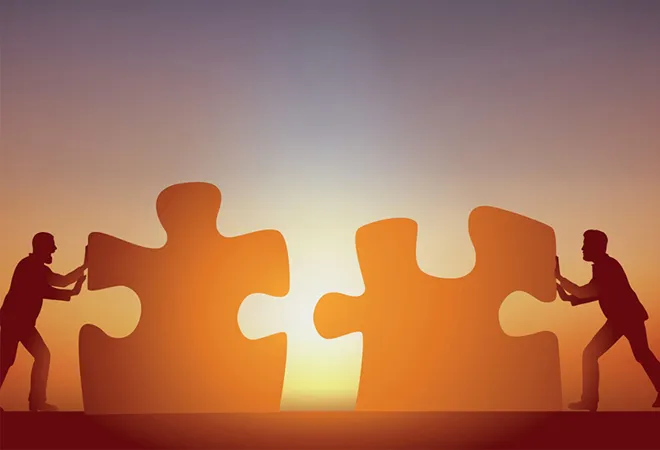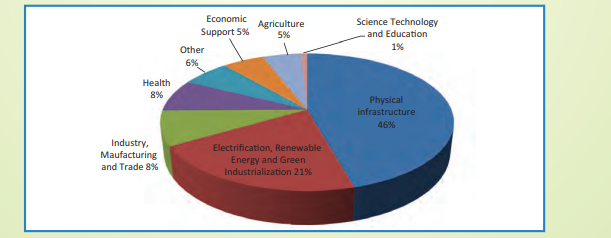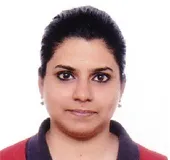-
CENTRES
Progammes & Centres
Location
As India completes 76 years of achieving independence, its emergence as a pivotal development partner has kickstarted a gradual revolution in global development

As the world continues to reel under the widespread impacts of the pandemic, the international system is currently on crutches. The pandemic also exposed the multiplicity of global challenges, such as the freefall of multilateralism and a feeble response from the Global North. Furthermore, the gap in financing for achieving the Sustainable Development Goals (SDGs) has increased from US$2.5 trillion to at least US$3.9 trillion per year since the onset of the pandemic. This is estimated to rise by US400 billion per year between 2020 and 2025. Several of the low-income and least-developed countries (LDCs) are facing the brunt—mounting debt burden, costly borrowing, food insecurity, and rapid inflation, to name a few. Development partnerships and robust collaborations have, thus, become crucial. In current times, the international aid architecture is characterised by the rise of the Global South, particularly India and China offering alternative modes of financial instruments and institutional arrangements to facilitate inclusive and holistic development. As India completes 76 years of achieving independence, its emergence as a pivotal development partner has kickstarted a gradual revolution in global development. It has also triggered a global conversation on the importance of Southern-driven partnerships towards strengthening the sustainability narrative.
The pandemic also exposed the multiplicity of global challenges, such as the freefall of multilateralism and a feeble response from the Global North.
Representing the vociferous voice of the South, India’s model of development partnerships has been making a mark for itself even before 1947. For instance, in 1946, the Indian interim government started to invite agricultural scientists from China and Indonesia as part of its capacity-building programmes. Underpinned by the spirit of ‘Vasudhaiva Kutumbakam’, its partnerships model is demand-driven, respecting the sovereignty of the beneficiary country with no-strings-attached conditionalities (Figure 1). Housed under the Ministry of External Affairs, India’s projects have been implemented by the Development Partnership Administration (DPA) since 2012. Depending on the priorities driven by the partner countries, India‘s approach towards development partnership is based on the ethos of the national movement.
Figure 1: Indian Ethos of Development Partnership
Source: DevCoopIndia, RIS, 2022
During the time it achieved independence, several of the developing regions were marred by challenges of rampant inequality, underdevelopment, racial discrimination policy of Apartheid, and colonisation. India was eager to share its knowledge, expertise, experiences, and resources to strengthen the movements of other developing countries, thus fostering a bond of camaraderie. The pain that the country itself endured during the colonial era contributed towards its understanding of the needs and challenges faced by fellow developing nations.
Depending on the priorities driven by the partner countries, India‘s approach towards development partnership is based on the ethos of the national movement.
PM Modi’s address at the Parliament of Uganda pretty much sums this up: “Our development partnership will be guided by your priorities. It will be on terms that will be comfortable for you, that will liberate your potential and not constrain your future… We will build as much local capacity and create as many local opportunities as possible.” Through its partnership programmes, India has been expressing solidarity and responsiveness to the priorities of partner countries. As a developing nation with limited resources, India has willingly offered its development experience to countries that wished to engage. This is illustrated by the Indian Technical and Economic Cooperation (ITEC) programme launched in 1964—well before the United Nations’ (UN) technical cooperation for development cooperation initiated in 1978. At a time when the world was divided between two blocs, with India leading the conversation on non-alignment, experts believe that ITEC was a manifestation of these ideals. Moving beyond the copybook South-South Cooperation (SSC), India extended its institutions, resources and capacities to support other developing regions. Till date, it has offered training to more than 200,000 officials from 160+ countries in both the civilian and defence sectors.
The other segments of India’s development partnerships include concessional Lines of Credit (LoCs) and grants-in-aid. As per the Ministry of External Affairs, till July 2023 about US$22,444.87 million has been extended under LoCs—this represents a 34 percent increase from 2017-18. About INR 73,785 crores has been disbursed as grants and loans, as of February 2023; this represents an increase of 28.3 percent for the period 2018-2023. The instrument of LoCs, operated presently by the EXIM bank of India, facilitate the funding of major projects with a primary focus on India’s neighbourhood and Africa (Figure 2). Over the past 15 years, around US$32 billion has been extended as LoCs, with around US$12 billion alone having been provided to African nations. Some of the success stories include sanctioning of US$447.17 million for railway transportation in Ghana, US$34.33 million for roadways in Maldives, US$200 million for power transmission and distribution in Senegal, US$31 million for petroleum/oil and gas in Mozambique, and US$60.69 million towards the water sector in Sri Lanka.
Figure 2: A Sector-wise Distribution of India’s LoCs (1947-2020)
 Source: DevCoopIndia, RIS, 2022
Source: DevCoopIndia, RIS, 2022
With the world well short of pace in achieving the SDGs under Agenda 2030, development partnerships are no longer a moral obligation. It has become a development imperative. In such a scenario, India’s model offering robust collaborations and cooperation carries the potential of being a game-changer. Comprehensive, holistic, and ‘human-centric’ in nature, New Delhi’s projects have been organically contributing towards sustainable development. Although there has been no policy-driven sustainability agenda under its development partnerships, India, through its various projects, has been pushing for protecting the future and crafting conversations around protecting the planet. Guided by the motto of Sabka Saath, Saba Vikaas, Sabka Vishwas—meaning “together, for everyone's growth, with everyone's trust”, India has been propelling the SSC and shepherding the cause of the Global South. Through its ongoing presidencies of the G20 and Shanghai Cooperation Organisation (SCO), India is working to build a consensus for establishing viable pathways towards political, economic, and social development.
The other segments of India’s development partnerships include concessional Lines of Credit (LoCs) and grants-in-aid.
During the pandemic, India upped its game by providing COVID-related medical assistance in the form of testing kits, protective gears, hydroxychloroquine and later on, vaccines to almost 90 countries around the globe under Vaccine Maitri. Interpreted as a first responder in emergency situations, New Delhi also extended technical assistance by dispatching rapid response teams to several of the developing regions at a time when global supply chains were severely disrupted. However, the time is now right for India for three key changes, to: a) establish a standalone international development cooperation agency, b) release a White Paper on its development partnerships detailing the objectives, goals and outcomes and finally, c) institutionalise sustainable development as a separate pillar under DPA.
Swati Prabhu is Associate Fellow with the Centre for New Economic Diplomacy (CNED) at the Observer Research Foundation
The views expressed above belong to the author(s). ORF research and analyses now available on Telegram! Click here to access our curated content — blogs, longforms and interviews.

Dr Swati Prabhu is Associate Fellow with the Centre for New Economic Diplomacy at the Observer Research Foundation. Her research explores the interlinkages between development ...
Read More +